10 Best Herbal Essential Oils For Sunburn

Herbal essential oils, such as lavender, chamomile, and calendula, are often used for their soothing and anti-inflammatory properties, making them popular for treating sunburn.
These oils can help reduce redness, pain, and inflammation associated with sunburn when properly diluted with a carrier oil. However, it is important to note that some essential oils may cause further irritation if not used correctly, so a patch test is recommended before application. While they can provide relief, they should not replace medical treatment for severe sunburn.
Always consult a healthcare professional for persistent or severe cases of sunburn.
Table of Contents
- 1. English lavender (Lavandula angustifolia)
- 2. Chamomile (Matricaria chamomilla)
- 3. Aloe vera (Aloe barbadensis)
- 4. Melaleuca (Melaleuca alternifolia)
- 5. Rosemary (Rosmarinus officinalis)
- 6. Eucalyptus (Eucalyptus globulus)
- 7. Lemon grass (Cymbopogon martini)
- 8. St. john's wort (Hypericum perforatum)
- 9. Marigold (Calendula officinalis)
- 10. Salvia (Salvia officinalis)
1. English lavender (Lavandula angustifolia)

Lavandula angustifolia, commonly known as English lavender, is renowned for its soothing and therapeutic properties, particularly when distilled into essential oil.
This oil is often used for its calming effects and has been traditionally applied to soothe skin irritation, including sunburn. The anti-inflammatory and antioxidant properties of lavender essential oil may help reduce redness, pain, and inflammation associated with sunburn. However, it is important to dilute the essential oil with a carrier oil before applying it to the skin to avoid irritation.
While lavender oil can provide relief, it should not replace proper sun protection and medical treatment for severe burns.
2. Chamomile (Matricaria chamomilla)
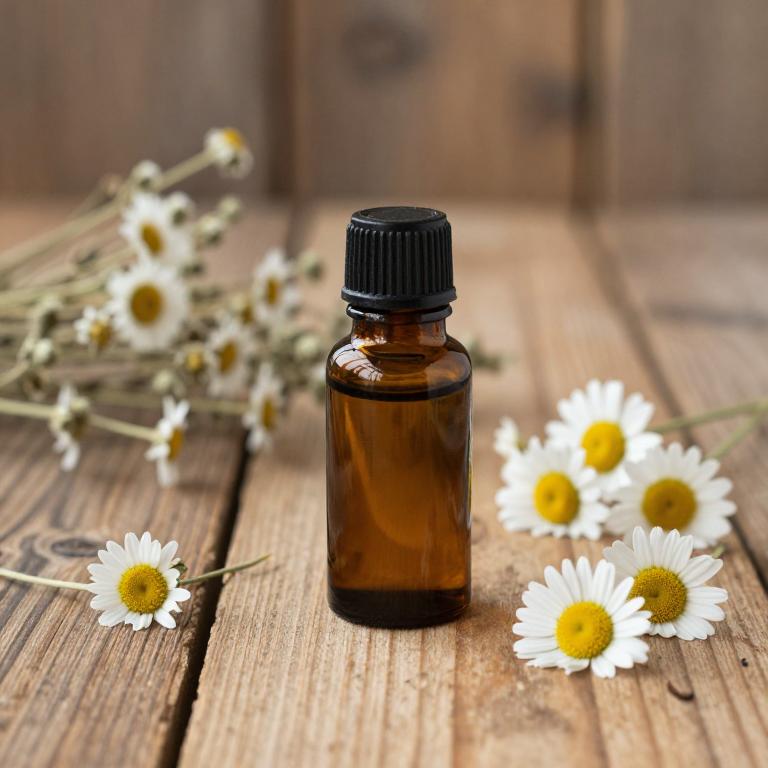
Matricaria chamomilla, commonly known as chamomile, is a popular herb used in the production of essential oils that have been traditionally valued for their soothing and anti-inflammatory properties.
When applied topically, chamomile essential oil may help alleviate the discomfort of sunburn by reducing redness and inflammation due to its high concentration of antioxidants and anti-inflammatory compounds. However, it is important to note that chamomile essential oil should be diluted with a carrier oil before application to avoid skin irritation, as it can be quite potent. While some people use it as a natural remedy for sunburn relief, it is not a substitute for proper sun protection and should not replace medical treatment for severe burns.
Always perform a patch test and consult with a healthcare professional before using essential oils for any medical condition.
3. Aloe vera (Aloe barbadensis)
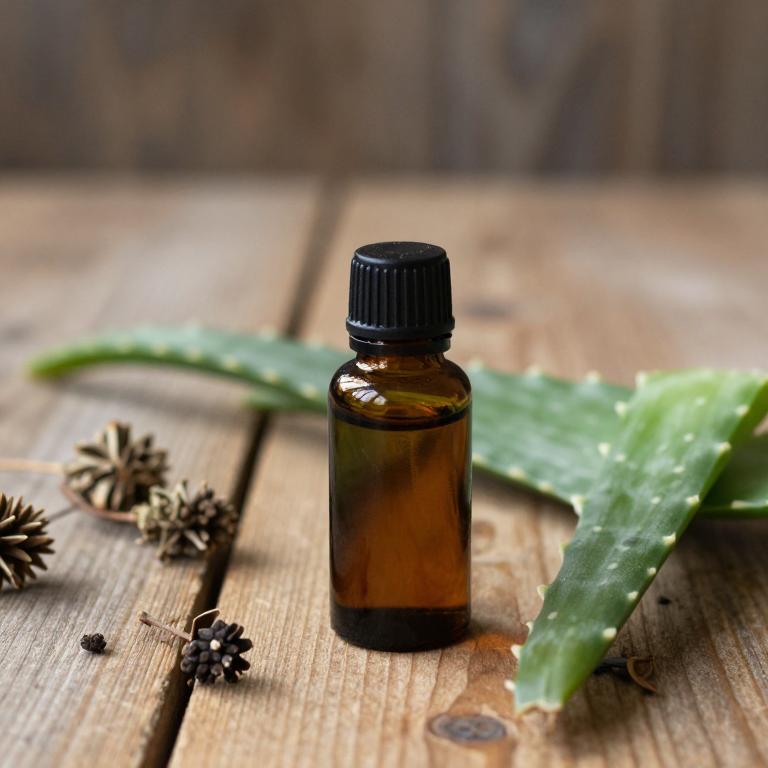
Aloe barbadensis, commonly known as aloe vera, contains a variety of beneficial compounds that make it effective for treating sunburn.
Its essential oils, derived from the gel of the aloe plant, are rich in antioxidants, anti-inflammatory agents, and moisturizing properties that help soothe irritated skin. When applied to sunburned skin, these essential oils can reduce redness, inflammation, and discomfort by promoting skin healing and hydration. The cooling effect of aloe vera essential oils also provides immediate relief from the heat and pain associated with sunburn.
However, it is important to use these oils properly, as some may cause irritation if not diluted correctly, and they should not replace medical treatment for severe burns.
4. Melaleuca (Melaleuca alternifolia)

Melaleuca alternifolia, commonly known as tea tree oil, is a popular herbal essential oil derived from the leaves of the Melaleuca alternifolia plant, native to Australia.
While it is widely recognized for its antimicrobial and anti-inflammatory properties, it is not typically used as a direct treatment for sunburn due to its potency and potential skin irritation. Some people may use diluted tea tree oil as a complementary remedy to soothe irritated skin and reduce inflammation caused by sunburn, but it should not replace proper sunburn care such as cool compresses, moisturizers, and hydration. It is important to consult a healthcare professional before using essential oils on sunburned skin, as improper use can lead to further irritation.
Overall, while tea tree oil may offer some soothing benefits, it is not a primary treatment for sunburn and should be used with caution.
5. Rosemary (Rosmarinus officinalis)

Rosmarinus officinalis, commonly known as rosemary, produces an essential oil that is often used for its soothing and healing properties.
While rosemary essential oil is not a direct treatment for sunburn, it can provide relief by reducing inflammation and promoting skin repair when diluted properly. The oil contains compounds like rosmarinic acid, which may help in reducing oxidative stress caused by UV exposure. However, it is important to note that rosemary essential oil should never be applied directly to the skin without dilution, as it can cause irritation.
It is best used as a complementary therapy alongside proper sun protection and after-care treatments for sunburn.
6. Eucalyptus (Eucalyptus globulus)

Eucalyptus globulus, commonly known as Australian eucalyptus, is a popular source of essential oils known for its refreshing and cooling properties.
While it is often used for respiratory support and muscle pain relief, some people may consider it for its potential soothing effects on sunburned skin. However, it is important to note that eucalyptus oil is not specifically formulated or recommended for treating sunburns due to its strong, camphor-like scent and potential for skin irritation. Instead, more suitable options for sunburn relief include aloe vera, chamomile, or lavender essential oils, which are gentler and more targeted for skin inflammation.
Always perform a patch test before applying any essential oil to the skin, and consult a healthcare professional if sunburn symptoms persist or worsen.
7. Lemon grass (Cymbopogon martini)
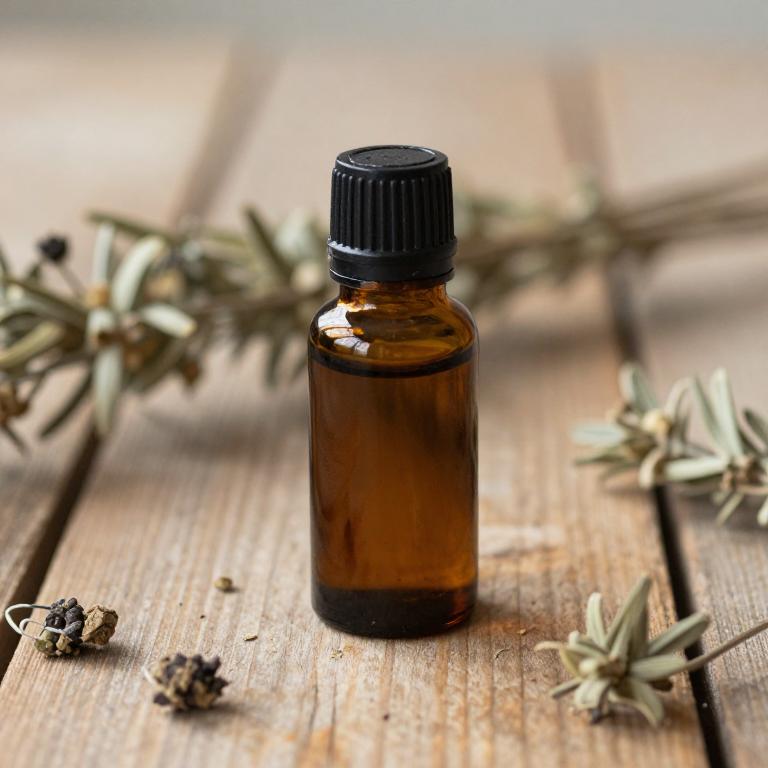
Cymbopogon martini, commonly known as citronella grass, produces a potent essential oil that has been explored for its potential benefits in alleviating sunburn.
The oil contains high levels of citral, a compound known for its anti-inflammatory and antioxidant properties, which may help reduce redness and discomfort associated with sunburn. While it is not a substitute for sunscreen, some studies suggest that citronella oil may offer mild protective effects when applied topically before sun exposure. However, it is important to note that citronella oil should not be used as a replacement for proper sun protection measures.
Due to its strong scent and potential skin irritation, it is advisable to dilute the oil with a carrier before applying it to the skin.
8. St. john's wort (Hypericum perforatum)
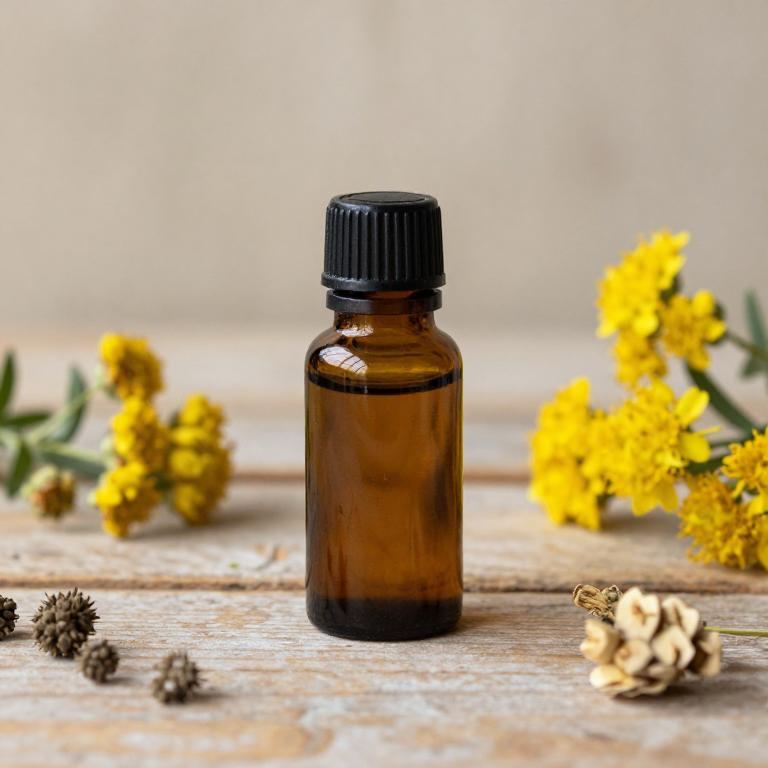
Hypericum perforatum, commonly known as St. John's Wort, contains essential oils that have been traditionally used for their anti-inflammatory and analgesic properties.
These essential oils may help alleviate the pain and inflammation associated with sunburn by promoting skin healing and reducing redness. However, it is important to note that direct application of St. John's Wort essential oil can be irritating to sensitive skin and should be diluted properly before use. While some studies suggest its potential benefits, there is limited scientific evidence supporting its effectiveness for treating sunburn specifically.
As with any herbal remedy, it is advisable to consult a healthcare professional before using St. John's Wort essential oils for sunburn treatment.
9. Marigold (Calendula officinalis)
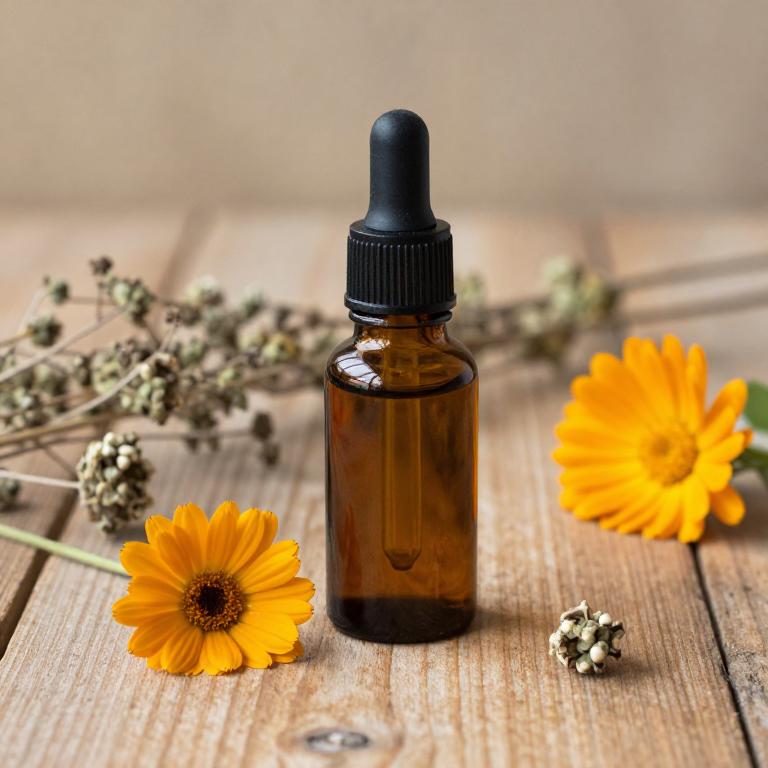
Calendula officinalis, commonly known as pot marigold, is a popular herbal plant known for its soothing properties, and its essential oil is often used in natural remedies for sunburn relief.
The essential oil derived from calendula contains compounds like flavonoids and triterpenes, which have anti-inflammatory and antiseptic properties that help reduce redness and irritation caused by sun exposure. When applied topically, calendula essential oil can promote skin healing and provide a cooling effect, making it a valuable ingredient in after-sun care products. However, it is important to dilute the essential oil with a carrier oil before use, as undiluted application may cause skin irritation.
Despite its benefits, calendula essential oil should not replace medical treatment for severe sunburns, and individuals with allergies should perform a patch test before use.
10. Salvia (Salvia officinalis)

Salvia officinalis, commonly known as sage, contains essential oils that have been traditionally used for their healing properties, including potential relief for sunburn.
The essential oils derived from sage, such as thujone and camphor, possess anti-inflammatory and antiseptic qualities that may help soothe irritated skin and reduce redness associated with sunburn. While some studies suggest that these oils could offer a cooling effect, it is important to note that they should not be applied directly to the skin without proper dilution to avoid irritation. Sage essential oil can be used in a diluted form as part of a topical treatment to aid in the recovery process of sunburned skin.
However, it is always advisable to consult a healthcare professional before using any essential oils for skin conditions, especially when dealing with sunburn.